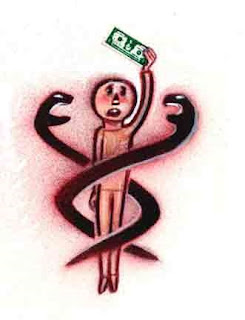 Ableson takes to task the role played by limited benefit plans. In his case study of now bankrupt Larry Yurdin, "$150,000 hospital coverage in the Aetna policy was mainly for room and board. Coverage was capped at $10,000 for “other hospital services,” which turned out to include nearly all routine hospital care — the expenses incurred in the operating room, for example, and the cost of any medication he received. In other words, Aetna would have paid for Mr. Yurdin to stay in the hospital for more than five months — as long as he did not need an operation or any lab tests or drugs while he was there."
Ableson takes to task the role played by limited benefit plans. In his case study of now bankrupt Larry Yurdin, "$150,000 hospital coverage in the Aetna policy was mainly for room and board. Coverage was capped at $10,000 for “other hospital services,” which turned out to include nearly all routine hospital care — the expenses incurred in the operating room, for example, and the cost of any medication he received. In other words, Aetna would have paid for Mr. Yurdin to stay in the hospital for more than five months — as long as he did not need an operation or any lab tests or drugs while he was there."Linking this back to the health care reform debate now underway, is there reason to be concerned that private insurance will jettison at-risk patients? Yes according to a former Cigna executive who cautioned "that lawmakers should be careful about the role they gave private insurers in any new system, saying the companies were too prone to 'confuse their customers and dump the sick.'"








1 comment:
Yes, even if everybody got its own insurance.. we still have to do something with the system.
Post a Comment